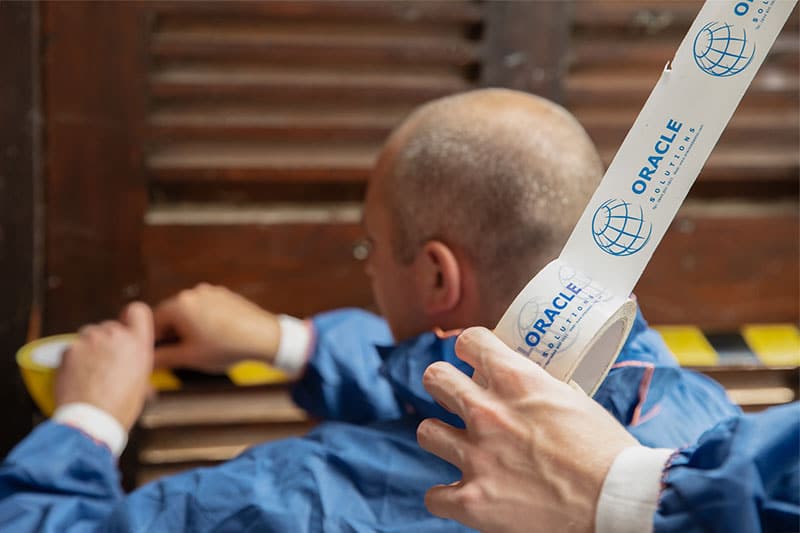Risks of using a non-UKAS accredited asbestos surveying company
Asbestos surveying is one of the necessary steps when ensuring a building or property is safe to live or work in. While it’s not a legal requirement for hiring an asbestos surveying company, we recommend looking for one that’s accredited by the United Kingdom Accreditation Service (UKAS). Doing so will ensure that the survey is conducted appropriately and safely, and that you’ll receive reliable advice on how to proceed.

According to its website, “UKAS is the National Accreditation Body for the United Kingdom. We are appointed by government to assess and accredit organisations that provide services including certification, testing, inspection, and calibration.” Asbestos accreditation from UKAS includes:
- Surveying
- Sampling
- Testing
- Clearance (four-stage process)
Asbestos surveying companies with UKAS accreditation are fully competent at what they do. Furthermore, the Control of Asbestos Regulations 2012 requires accreditation for some asbestos-related activities, such as air sampling, fibre counting, and identifying asbestos in bulk material.
The UKAS website makes it easy to search for accredited companies, too. For example, here’s our accreditation, which you can find by typing our business name into the search field.
Let’s discuss the role of accreditation and why it’s so important for ensuring quality and reliability when hiring an asbestos surveyor.
What are the risks of using a non-UKAS accredited company?
It can be unsafe to go with an asbestos surveyor that’s not UKAS accredited. For example, staff members may be inexperienced, or the company may not have the necessary resources.
More importantly, if the survey isn’t properly carried out or the company operates unprofessionally, you may not get the sound advice you need about managing asbestos on your property.
In this section, we’ll go over the many risks posed by non-accredited surveyors.
Lack of quality assurance
Non-UKAS accredited companies may lack the necessary quality control measures. For example, they may not conduct the survey correctly or produce a thorough report. Overall, a non-accredited company is unlikely to have a system for quality management.
This can mean a higher risk of errors and inaccuracies, as well as inadequate reporting. Until the proper standards are met, you could either have a building that’s unsafe for occupants, or you’d have to spend more money to have an accredited company re-survey the building.
Inadequate training and expertise
Non-accredited companies may have insufficient training and expertise in asbestos surveying. Surveyors without the proper experience or qualifications may be tasked with the job. This leads to an increased likelihood of incomplete or incorrect identification of asbestos-containing materials (ACMs).
It also puts building occupants in danger. If a contractor accidentally damages an ACM during the survey, asbestos fibres can contaminate the air.
Non-compliance with regulations and standards
Non-UKAS accredited companies may not adhere to industry regulations and standards. This causes an increased risk of non-compliant surveys and failure to meet legal requirements.
Since it’s the duty holder’s responsibility to manage asbestos on a property, the company’s shortcomings could leave you vulnerable to legal action. That could include hefty fines or even imprisonment.
Invalidated survey reports
Survey reports from non-accredited companies may not be recognised or accepted by regulatory bodies. Consequences of this include delays in project approvals and potential legal implications.
For example, certain types of asbestos analysis, such as assessing the concentration of airborne asbestos fibres, are only allowed by an accredited surveyor. If an unaccredited company conducts this type of survey, the report won’t be legitimate.
Compromised health and safety
Non-accredited surveying companies may not prioritise adequate health and safety measures. And even if they have created in-house best practices, their health and safety policy won’t have been vetted by a third-party authority. This means there’s an increased risk of asbestos exposure and associated health hazards for workers and occupants.
Limited liability protection
Non-UKAS accredited companies may have limited liability insurance coverage. This offers inadequate protection against potential claims and liabilities related to surveying services.
Furthermore, insurance brokers and underwriters tend to offer lower insurance premiums for UKAS-accredited companies. Without accreditation, though, those lower premiums aren’t available.
If the surveying company is paying a lot for insurance, the cost could be passed along to you, and you may end up paying more to hire an unreliable company.
Reputational and financial risks
Engaging a non-accredited surveying company may damage your business reputation. Unexpected consequences include potential financial losses, project delays, and legal consequences.
For example, you may need to hire another company to carry out a survey the right way. Or, if the surveyor causes damage to the building while on the job, you’ll have to add repairs to your overall costs.
Lack of independent auditing and oversight
Non-UKAS accredited companies are not subject to regular independent audits. Audits ensure that companies are performing well and following procedures. Without audits, non-accredited companies have a higher probability of unchecked performance and quality issues.
The importance of using a UKAS accreditation company
The best option is to hire an asbestos surveying company with an ISO/IEC 17020 accreditation from UKAS. This is the recognised standard for companies that conduct inspections.
A surveyor with this accreditation will have technical competence and will survey in accordance with Health and Safety Executive (HSE) guidelines for asbestos.
There are a number of benefits of using a UKAS-accredited surveying company, including:
- Essential resources, including facilities and tools, are available.
- Processes for everything from safety to customer service are implemented.
- Safeguards like liability insurance are in place in the event that they’re needed.
- Technical assessors will externally audit the company on a regular basis.
- Technical competence in the required work is consistently demonstrated.
- There’s a procedure for making a complaint in case you’re unsatisfied with the work.
- Asbestos surveying work will be delivered to the highest standard.
According to the HSE, “The only way to confirm definitively if a suspect material does contain asbestos fibres is to analyse a representative sample of that material. Analysis of asbestos samples is a skilled and specialist task, and trained and competent analysts in analytical laboratories must be used.”
Without an accredited surveyor, you can’t be sure that the materials in your building are safe to be around. You also can’t rely on the advice you receive from a non-accredited company.
Even the act of sampling can disturb an ACM to the point of releasing fibres. That’s why the person doing the sampling must be well-trained and competent.
On top of keeping everyone in the building safe, you have a legal obligation as the duty holder to responsibly manage asbestos on the premises. Failing to do so could result in serious legal trouble.
Final thoughts about UKAS accreditation for asbestos surveyors
There are a broad array of risks when hiring a non-accredited asbestos surveying company:
- Financial risks
- Health and safety risks
- Incompetent surveyors
- Lack of independent audits
- Limited insurance coverage
- Non-compliance with the law
- Poor quality assurance
- Unusable survey reports
For reliable, recognised, and legal asbestos surveying, always hire a UKAS-accredited company. Remember, if your surveyor didn’t adequately identify the location and type of ACMs on your property, you’re responsible. Otherwise, you will not have met the duty to manage asbestos requirements according to the Control of Asbestos Regulations 2012.
From following industry best practices to avoiding legal trouble and, of course, keeping everyone safe, asbestos management isn’t something you want to cut corners on.

Written by Mark Carter
Mark Carter is a renowned expert in asbestos management, offering clients vital guidance on compliance and safety. His expertise is invaluable for navigating asbestos regulations, ensuring both safety and legal adherence. Mark's role is central in providing effective asbestos-related solutions, helping clients achieve their business objectives with an emphasis on regulatory compliance and safety in asbestos management.
